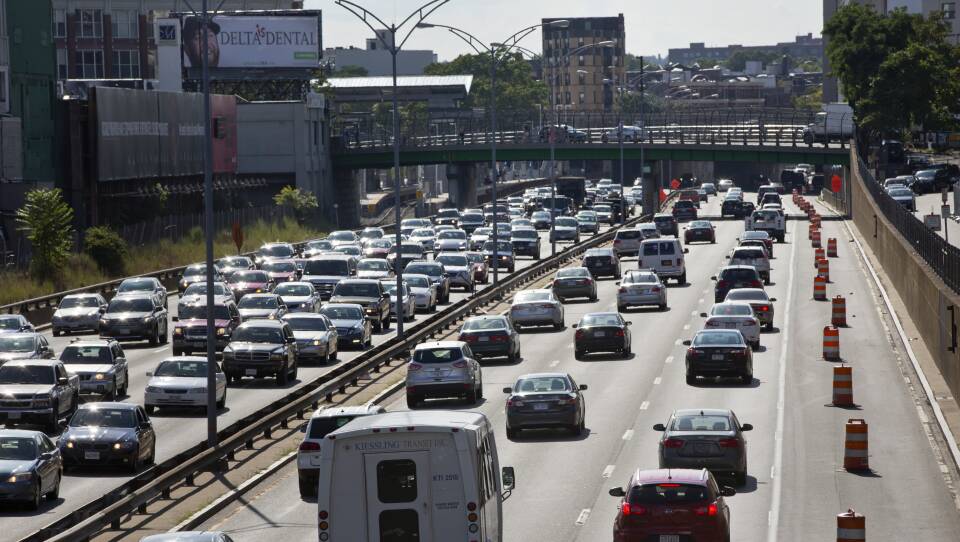Boston has some of the worst traffic in the nation.
According to the transportation company Inrix, Boston is the seventh worst city in terms of traffic congestion — Bostonians spent an average of 60 hours in congestion in 2017. But one doesn't have to inform Boston drivers about the latest ratings; they already know how bad the traffic is. Few disagree that traffic congestion has reached crisis proportions and is threatening Boston's economic boom.
But what can be done about it? More roads? Better T and train service? More buses? Although that's what many propose, none of those options really work, according to academics who have studied the issue. Governor Charlie Baker vetoed one effort to do something about it when he rejected a bipartisan proposal from Beacon Hill to reduce tolls on the Mass Pike, Tobin Bridge and the two harbor tunnels during off-peak hours.
Lawmakers like Senator Joseph Boncore of Winthrop, chair of the Senate transportation committee, were shocked by the veto, thinking a proposal to impose a lower toll would get the governor's blessing. But Baker said the legislature was "putting the cart before the horse" by moving ahead with a plan before studying whether it might work.
In vetoing the bill, Baker wrote that lowering tolls on the few roads that actually have tolls "is not an effective response to road congestion, disadvantages those who must drive during the busiest times to get to work and school, and reduces the revenue available to maintain and upgrade those roadways." The governor instead called for a comprehensive study of congestion on Massachusetts roadways.
Boncore told WGBH News, "The time for studies is over. We need a pilot program, we need to see what we can actually do about congestion." Boncore added the proposal isn't dead and would come up again in the next legislative session.
Adjusting tolls depending on the time of day and demand is known as congestion tolling, or "smart tolling." It is used currently in 11 other states and internationally, in Singapore, London and Stockholm.
Professor Michael Manville of UCLA agrees. He says there have been enough studies of traffic congestion, and "there is virtual unanimity among those of us who study traffic congestion that one thing, and one thing only reduces it, and that is congestion pricing."
But Manville admits that in places where congestion pricing works, tolls are usually raised during peak hours, unlike the Massachusetts plan, which would lower tolls during non-peak hours. Manville says studies have shown that people are motivated more by price increases than price cuts. But he says the Massachusetts plan is worth a try to see what would happen.
Regular users of the Mass Pike at the Natick Service Area had mixed reactions to the proposal. Joe Ryan of Framingham likes the idea of congestion pricing, but not the possibility of a toll increase.
"That one's a little tough," Ryan said. "You're already going through the headache of sitting through traffic and now you'd have to pay a little bit more. That one I don't so much agree with."
But Rich Burke of Springfield says paying higher tolls during peak demand makes sense.
"I think it will work to alleviate some of the congestion and move some of the traffic to less busy times," he said. "I think it's a sensible plan."
Manville says there's no question that so-called dynamic tolling works, especially on tolled lanes in California.
"You can go on Youtube and look at footage of them. They just zip right along, while all the free lanes around them are mired in traffic."
And, Manville says, once commuters see that difference, their opposition to higher tolls tends to evaporate. But he admits getting politicians to back the idea of raising tolls isn't easy.
"Politically there is no denying it's a tough sell, but if we actually want to take on this problem, some bold leader has to step forward and say this is what it's going to take," said Manville.
When rejecting the legislature's test of congestion tolling, Baker did raise another possibility. "We should do a congestion study about a lot more than just tolling on two or three roads," he said. "There are many routes in and out of Boston that don't have tolls."
Experts say spreading tolls to other roads and bridges may fund transportation more fairly, but it won't do anything about rush-hour congestion. The only way to cut back on traffic, they say, is to hit people where it hurts for being on the road — in their pocketbooks.





